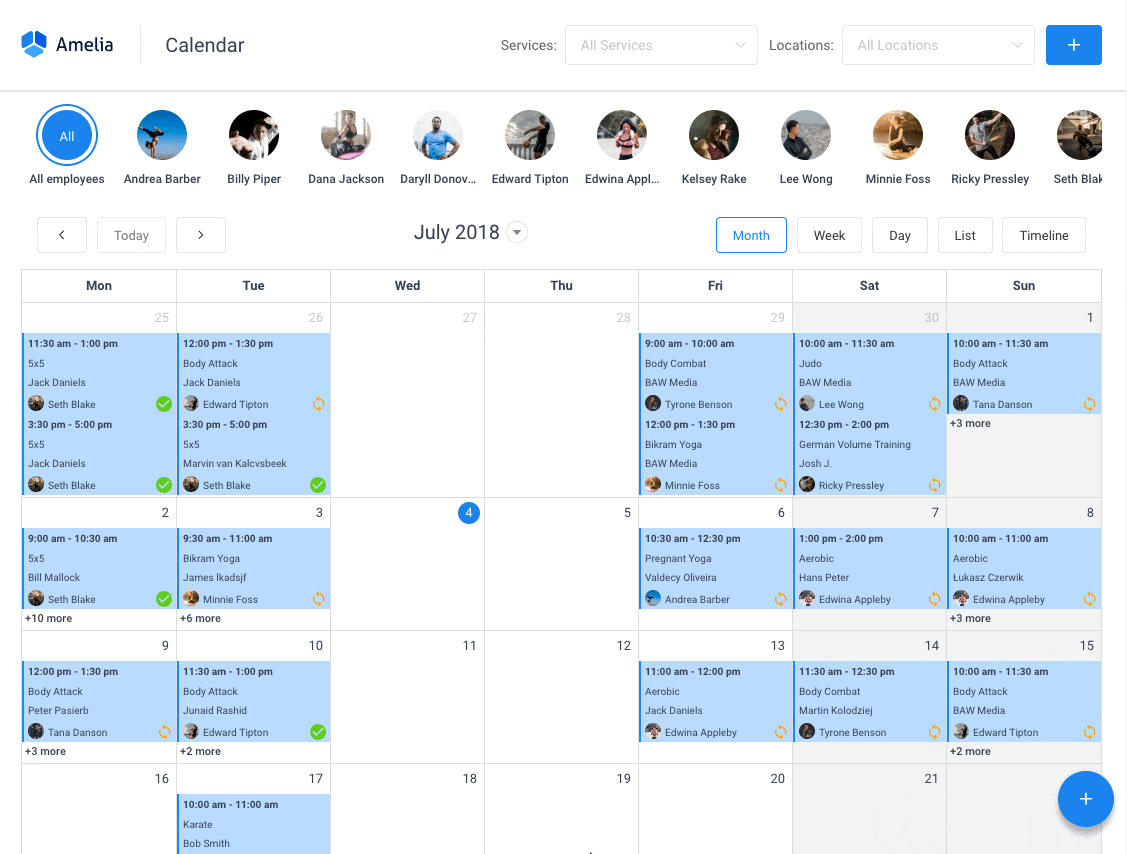This is a comparative article about Calendly vs Acuity, but how did we get here to need these scheduling tools?
In today’s world, it is more important than ever to manage your time wisely. While you are trying to make and keep appointments with others, they are also trying to make and keep appointments of their own, and this can be challenging.
Usually, this simply results in an agreement never being reached and can include more time wasted on calls and messages than producing actual results.
However, these obstacles can easily be overcome with the use of appointment scheduling software, which can help you manage your time and make your life easier. In this article, we will be discussing two scheduling tools that aim to do just that.
Although both Calendly and Acuity Scheduling were created to help better coordinate our time, each offers its unique characteristics that make deciding which to use a challenge in itself.
Fortunately, we have done our research, and in this article about Calendly vs Acuity, we will share with you what we’ve learned so that you can make the decision yourself.
What are Calendly and Acuity Scheduling about?
Calendly is an online scheduling tool that has the ability to connect with up to six different calendars, allowing customers to accommodate their itinerary while the software takes care of organizing it.
Acuity Scheduling, on the other hand, is more like a personal assistant than calendar scheduling software. Acuity supplies you with a range of tools perfect for business administration, including allowing you to accept payments, create customer reservations, and more.
When comparing Calendly and Acuity Scheduling, there are lots of things to look at among which are the booking process, group scheduling features, client management options, the existence of a free plan, the ability to handle online payments flawlessly, and Google Calendar integration.
Why should I use Calendly?
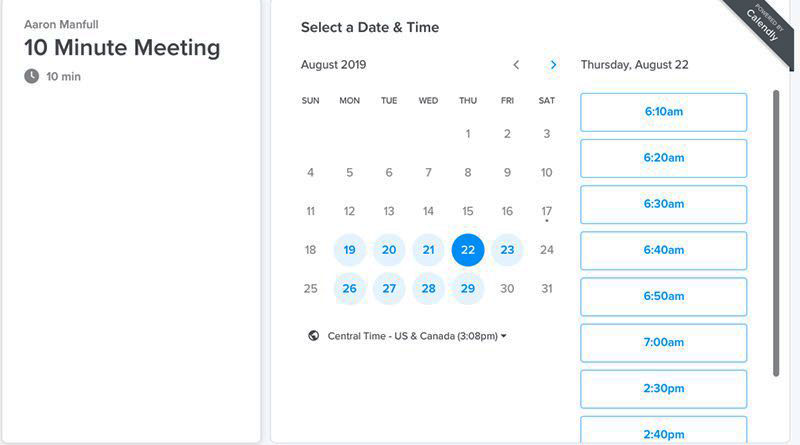
Calendly stands out for its ability to make scheduling meetings simple and efficient. Calendly’s options are not overly complex, but they are more than enough for companies and booking sites that are just starting out.
With a little expertise, Calendly can also be used to contact clients interested in your services, especially since it offers a simple interface that works with outbound links that can be shared with everyone.
Calendly also works best when looking for an integration with other add-ons, such as Zapier, which also increases compatibility with more applications. The result is a more cohesive, complete piece of software.
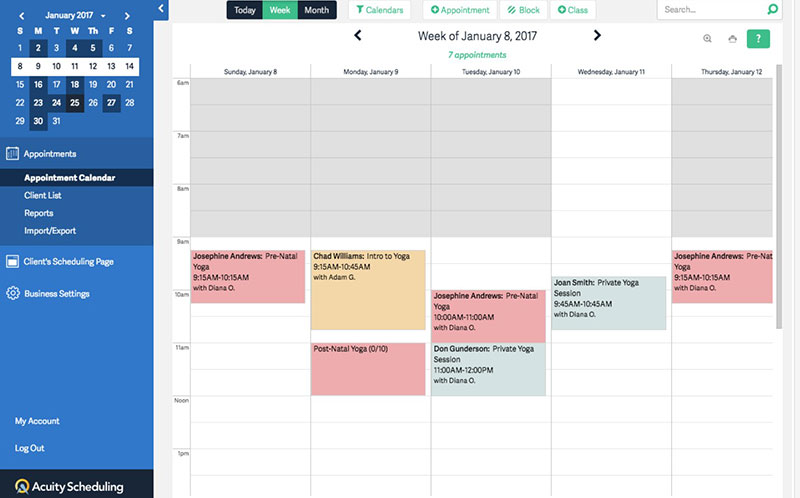
Acuity Scheduling is intended more for big companies due to the facilities it provides to receive payments from users. At the interface level, it is simple to understand, which allows staff to efficiently manage reservations. Although additional plug-ins are not necessarily required, as you can also choose to use its open API supports, which allows customization of its features.
As mentioned, Acuity is similar to that of a personal assistant in that it handles reservations, shows all times available, and schedules them on the calendar. The application can also accept payment immediately if the client wishes to reserve a space.
How about you try a WordPress-based scheduling option?
You can manage your business and grow your brand with a powerful WordPress booking plugin that keeps all of your appointments in line, your clients organized and your business booming.
Amelia is perfect for business owners who need to streamline their booking experience both for their staff and their clients. There are plenty of reasons why Amelia trumps Calendly and Acuity, especially for WordPress users.
Amelia handles everything for you, even sending automated email or SMS reminders to your clients. No-shows? Not anymore!
The Amelia WordPress booking plugin adapts to different industries for a blissful online booking experience and employee management.
Want to know more? Check out Amelia’s awesome features to see what you are missing.
Calendly vs Acuity: Which One Is Easier to Learn?
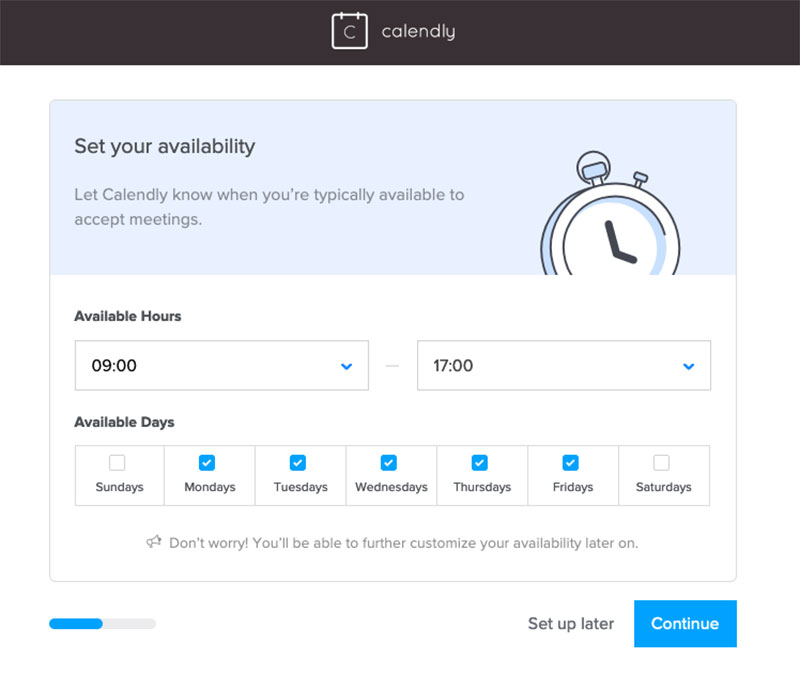
Between Calendly and Acuity, the learning differences are minimal. Calendly requires a basic knowledge of online navigation since the windows of the program make creating various reservations simple.
However, the Acuity developer team has done its job in facilitating the learning of its online appointment scheduling tool. The heavier parts are already set by default, so all that is needed is to make some small changes to suit personal preference.
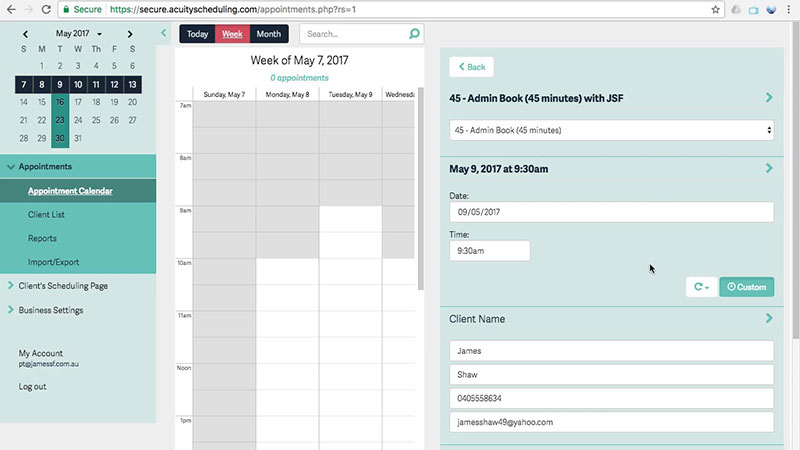
The ability to message and receive notifications comes already included in Acuity Scheduling, as well as the self-programming of reservations. All that is needed is to activate the different add-ons that allow the use of external applications such as Google Calendar, MailChimp, or iCloud. Luckily, this task is also very simple.
Management of Available Spaces and Calendars
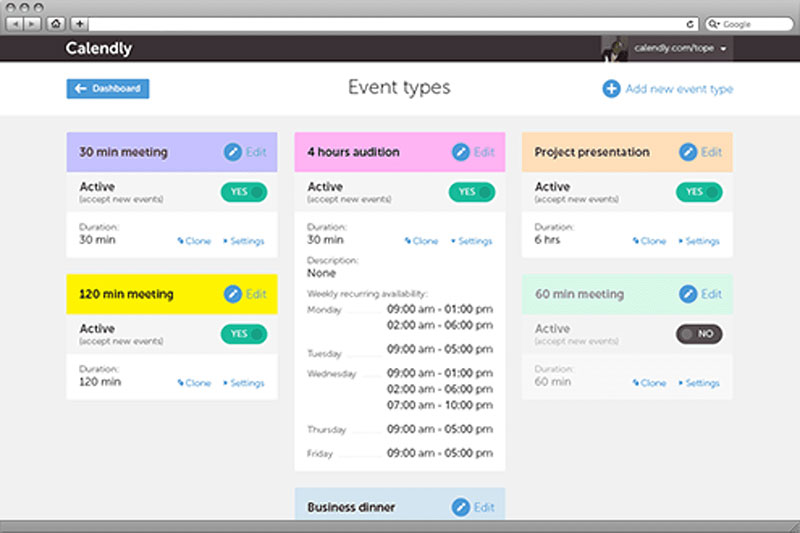
We cannot accurately compare Acuity and Calendly without mentioning the booking calendars. The calendars are the main function of Calendly, and it allows up to six external calendars in order to schedule meetings. The programming of these can be done in different groups, such as work networks or for clients. Schedules and rules that you have already scheduled will not be affected by plan changes.
If the staff you are organizing meetings for is outside the company, you can simply share a link to the scheduled event. From there, everyone will be able to see the information and rules that you provided to the whole group.
Acuity Scheduling offers more complex options for organizing appointments and reservations. Both the client and the site coordinator can see the schedules available in real-time. Also, to ensure that no one misses an appointment, the software will send the corresponding notification.
One advantage of Acuity is that it can be used from any smartphone, so it can be checked at any time, no matter where you are. If you are not sure of the time zone in which a reservation was scheduled, Acuity uses the local schedules of each client so that they know exactly when they are due, and you can register it in your local time, which is especially useful when there are reprograms.
Customization Tools
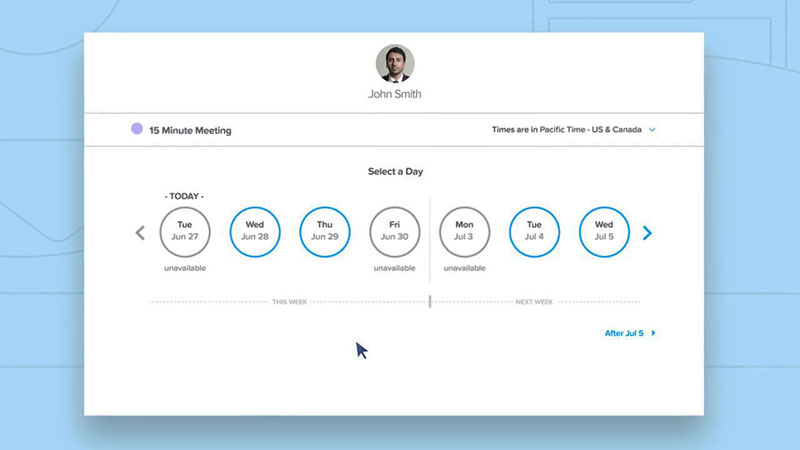
Calendly works similarly to Microsoft Online tools for editing documents. This provides you with a URL, which indicates what types of people can access it. For example, if a meeting is scheduled for prospects only, this link will only be accessible for them.
With Calendly, you can also determine certain rules so that meetings can be scheduled, such as minimum time in advance so that no one can create last-minute meetings, a maximum number of meetings per day, and even a time buffer for before and after the event.
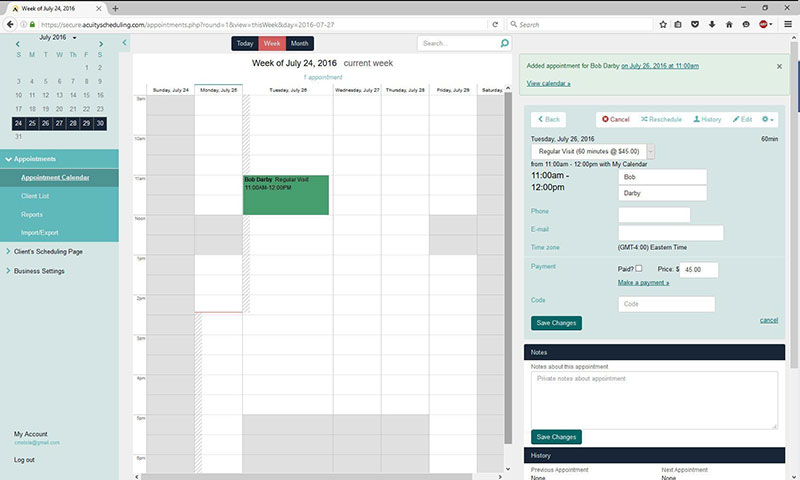
On the other hand, the Acuity Scheduling software does not share a link to the public, but directly shows the calendar of events to those it is provided to. This can be shared through multiple social networks (in addition to email), and we can even get a code to publish it on our website. Regardless of where it is placed, it will always be updated.
The rules for appointments are very similar to those offered by Calendly. You can place time in advance, an interval between appointments so as not to overload yourself or the staff, and a wonderful option that allows blocking available schedules of the calendar with the pretext that you are “busy”.
Compatibility and Complements
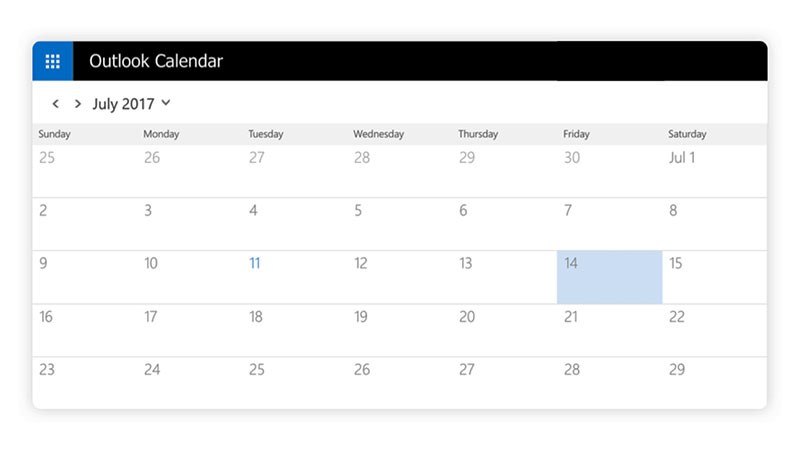
Calendly offers integration with the world’s most used calendars, such as Google Calendar, Outlook Calendar, Office 365, and iCloud, in addition to Zapier support. This means that you can install CRM advisors like RedTail and Wealthbox. With the Pro version, you can also use Salesforce.
Although it is not its main strength, the Calendly software can accept payments through PayPal and Stripe. You can also schedule automatic meetings by using the GoToMeeting software.
Although it has no option to publish a calendar, you can place scheduling forms on different websites, such as your personal or business page. Since the software is responsible for meeting scheduling, it will not matter if you place the form in different places, as reservations cannot be superimposed.
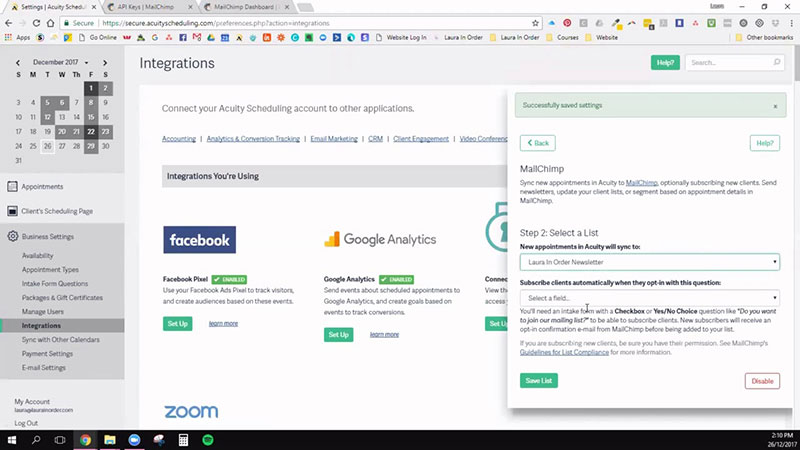
Acuity is not far behind in terms of compatibility. The Acuity Scheduling software also has integration with the main digital calendars in the market. However, compatibility with external applications goes much further, having dozens of extensions to choose from. Acuity is unique when it comes to adapting to the user. While the base software is already quite complete, there are always options to improve it.
Among the platforms with which it can be integrated are online conference services, such as GoToMeeting and Join.Me, payment processors like Square, Stripe, and PayPal, messaging and mass email services like MailChimp, ConvertKit, and Aweber, and compatibility with CRM advisors.
What about customer care?
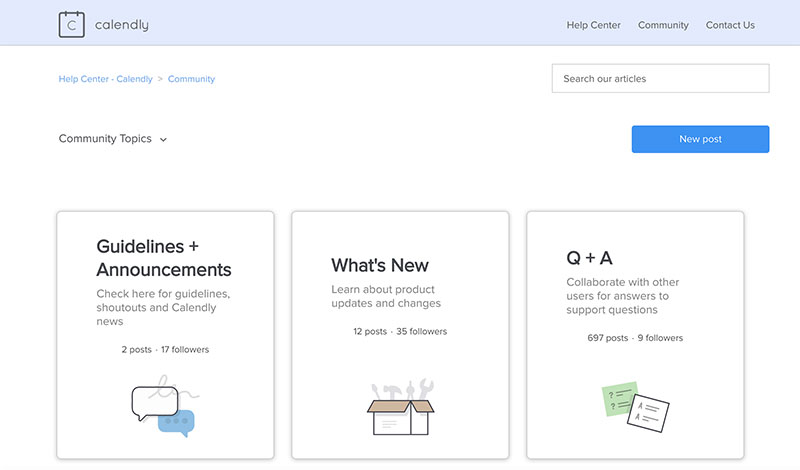
The customer service aspects of both Calendly and Acuity play a fundamental role, especially if you do not have much experience with computers. Calendly offers basic customer service, where you only receive a manual explaining each of the functions of the program, as well as some questions we may have about the configuration process.
Calendly also has specialized personnel to answer your questions and help you use the software. This works through a request system, so you must wait for your turn, which could belong since users who pay for the Pro subscription will have priority over the ones using the free version.
Each one of Acuity’s windows has an explanation of its operation, as well as links to related articles that can help solve your issues, making it an intuitive software to learn. Of course, all this is offered in a large catalog of information, but since there are direct links within the same software, we can resolve any doubts we may have as we use it.
If you do not want to read through an abundance of information, you can always watch some of the helpful videos or live seminars offered by the developer team. If all this still does not solve the problem, you can also send a form to the support team.
Calendly vs Acuity: Prices and Promotions
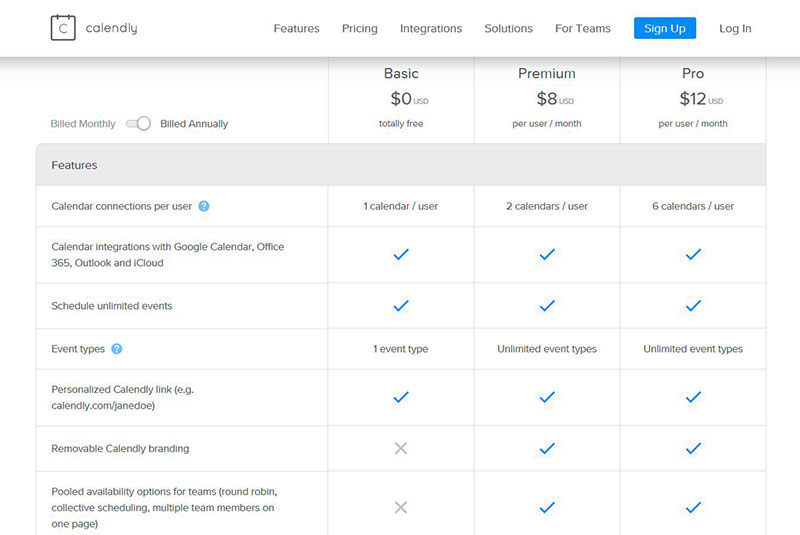
When comparing two different scheduling software, the comparison would not be complete without mentioning the price of each.
Calendly is the more accessible scheduling tool if you are looking to pay. The free plan is perfect for learning how to use the tool, in addition to offering one calendar template, integration with all calendar services, unlimited event programming with one type of event, a custom URL, notification system, basic technical assistance, and the possibility of adding Calendly to our website.
For $8 per month, the Pro Plan includes all the above, in addition to an increased number of calendars. It allows scheduling more than one type of event among a large number of options, both individual and group scheduling, event statistics, integration with Zapier, Zoom, GoToMeeting, different webhooks, and the technical service guarantees a response in less than three hours.
Finally, there is the Premium Plan for $12 per month, which increases the number of calendars to six per user, adds SMS notifications, allows you to redirect guests, and adds support for payment processors and SalesForce.
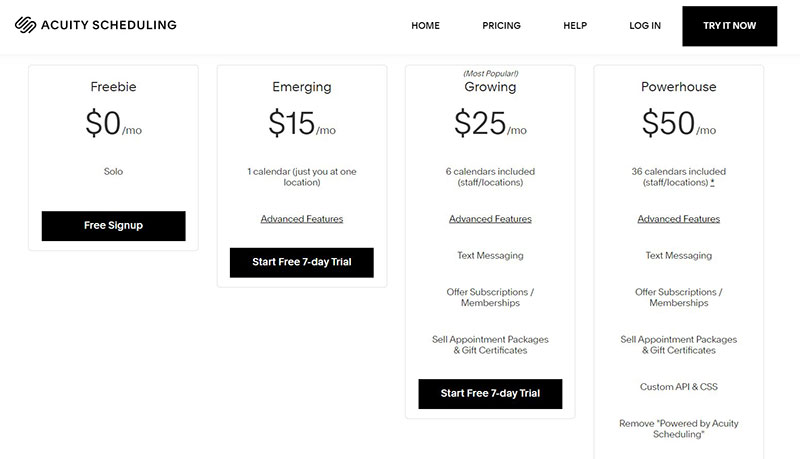
Acuity Scheduling, on the other hand, can be a more expensive scheduling tool. From its free version, it offers the basics to start, such as an automatic programming calendar and the possibility of creating unlimited services.
With the $15 monthly plan, you gain access to the vast majority of software options, such as compatibility with payment processors, email reminders, conversion of reservations to the corresponding time zone for customers, the ability to add your logo, colors, and personal texts, integration with Zapier, synchronization with external calendar applications, and much more.
The $25 monthly plan allows calendars for the staff, in addition to including worldwide text message reminders, as well as the possibility of offering gifts, subscriptions, and promotions.
Finally, the most expensive of its paid plans, costing $50 per month, allows up to 36 calendars, all of which will adapt the time zone to both customers and staff, personalized API access, and includes a BAA signature for HIPAA compliance.
Which is better, Acuity or Calendly?
Get an app that’s better than Calendly or Acuity
With Trafft you can Schedule on-site or virtual appointments, meetings & events, manage staff and services, accept payments, send automatic reminders, and much, much more.
Trafft streamlines the scheduling process for your potential customers by making it easy and fast to book and pay for your services, improving the interaction rate, and boosting conversions by up to 30%.
If you want to spend 2 hours less daily on admin tasks, you should get Trafft.
FAQs about Calendly vs Acuity Scheduling
1. What is the difference between Calendly and Acuity scheduling software?
Users of two well-known scheduling programs, Calendly and Acuity, can arrange meetings, events, and appointments with customers and coworkers.
Both programs offer numerous features including appointment confirmation and reminders, group scheduling, and analytics, and they both interact with widely used calendaring systems like Google Calendar and Outlook.
It’s crucial to compare them based on your unique demands because there are variances in cost, user interface, customization choices, and other features.
2. Which scheduling software is better for small businesses: Calendly or Acuity?
Small businesses can use either Calendly or Acuity, but the decision will be based on your company’s unique needs.
While Acuity offers more customization possibilities, integrations, and sophisticated features like appointment packages and subscriptions, Calendly has a more straightforward user interface and pricing scheme.
When deciding between Calendly and Acuity, you should ultimately take your budget, scheduling volume, and business goals into account.
3. Can both Calendly and Acuity integrate with my existing calendar system?
Yes, Calendly and Acuity can both link with different calendaring platforms like iCloud, Google Calendar, and Outlook.
This enables users to avoid scheduling conflicts by synchronizing their schedules across many platforms. It’s crucial to examine the compatibility and restrictions of your desired calendar system because certain integrations can require additional setup or expensive plans.
4. How do Calendly and Acuity handle appointment confirmations and reminders?
Yes, Calendly and Acuity can both link with different calendaring platforms like iCloud, Google Calendar, and Outlook.
This enables users to avoid scheduling conflicts by synchronizing their schedules across many platforms. It’s crucial to examine the compatibility and restrictions of your desired calendar system because certain integrations can require additional setup or expensive plans.
5. Are there any differences in the user interface or user experience between Calendly and Acuity?
Although both Calendly and Acuity strive to be understandable and user-friendly, their user interfaces and experiences are distinct.
Acuity is a more aesthetically pleasing and configurable interface that offers more choices for branding and personalization than Calendly, which has a simple and basic design that places an emphasis on the scheduling process. Depending on their visual tastes and convenience of use, users may favor one over the other.
6. Can Calendly and Acuity be used for group meetings and events as well as one-on-one appointments?
Yes, group scheduling and events like team meetings, webinars, and lectures can be planned using both Calendly and Acuity.
While Acuity offers capabilities like group booking pages, automated time zone identification, and capacity restrictions, Calendly allows customers to establish event kinds with a variety of available options and unique queries.
Additionally, users can manage numerous participants and send follow-ups or reminders to groups.
7. What kind of reporting and analytics are available with Calendly and Acuity?
Both Calendly and Acuity provide insights on scheduling activity and performance, but they each offer a distinct kind of reporting and analytics.
While Acuity’s reports cover parameters like revenue, appointment kinds, and no-show rates, Calendly’s analytics offer measures like appointment volume, conversion rates, and guest comments. Data can be exported by users for use in other programs or for additional analysis.
8. Can Calendly and Acuity be customized to match my brand’s colors and logo?
Yes, users may add their company’s colors, logo, and photos to the scheduling pages on both Calendly and Acuity.
This can improve brand recognition and loyalty while also assisting in the development of a consistent and professional image. Users can modify their scheduling workflows to meet their unique requirements by adding new fields, pages, and URLs.
9. How does the pricing of Calendly and Acuity compare, and which is more cost-effective?
The cost of Calendly and Acuity varies according to the plan and features you chose, the number of users, and the number of appointments.
While Acuity’s prices start at $14 per month and go up to $45 per month for premium capabilities, Calendly’s rates range from free to $15 per user per month. To evaluate which tool is most cost-effective for their company, users should examine the features and prices of each.
10. Are there any limitations on the number of appointments or users I can have with Calendly or Acuity?
Depending on the package chosen, Calendly and Acuity have different restrictions on the number of appointments and users. One event type and an unlimited number of monthly appointments are included in Calendly’s free plan, while bespoke branding and more capabilities are available in its subscription plans.
Depending on the tier, Acuity’s plans offer a specific amount of appointments and users, ranging from one to 36 employees and up to 20 appointment kinds.
Additionally, Acuity provides services like customizable intake forms, automated email and SMS reminders, and payment acceptance. To choose which plan and tool is best for them, users should carefully analyze their scheduling requirements and growth expectations.
If you enjoyed reading this article about Calendly vs Acuity, you should read these as well:
- Calendly alternatives that are actually better
- Calendly vs Doodle
- ScheduleOnce vs Calendly
- Calendly vs YouCanBook.Me
- How to Embed Calendly in WordPress Without a Plugin
- Looking for a Calendly Affiliate Program?
- Acuity Scheduling Vs Setmore

